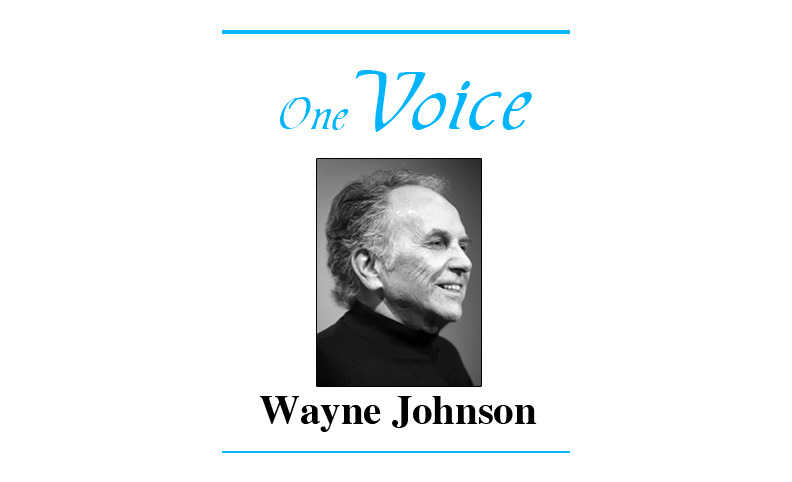
Happy four days after Father’s Day and five days after Juneteenth Day, or as the GOP likes to call it, “Huh?”.
It seems my holiday columns always wind up in The Voice after the holidays about which I’ve chosen to write (notice how I didn’t end that sentence with a preposition). As with mothers, I’m assuming here the majority of us had fathers in one form or another.
My father was easygoing fellow who was interested in how things work, nature, being self-sufficient and practical, and the importance of acquiring knowledge. He always had time to explain things and pass along sage bits of wisdom. One bit planted firmly in the ever-shriveling husk of my brain that I’ve chosen to ignore on multiple occasions (not my shriveling brain husk, but the bit of sage advice) was to never get married.
When my father came to the United States across the northern border, he spoke only Ukrainian. He learned English and took great pains to see that I used correct English in my speech and written words, which you can see was a lost cause. It seems to have eluded some members of our current younger generations, as well. My father, by the way, had lost any trace of an accent by the time I was old enough to understand English. He eventually began writing poetry and had a weekly poem read on the air by Chicago radio personality Franklyn MacCormack.
Some weeks back, Chas Coddington had a wonderful column about the English language and its parts of speech. I’ve read it over many times and I’m still trying to figure it out. You younger readers though, should take note of the words of the Chas because you’re the ones who need good communications skills to land a decent job. His column was filled with samples of proper English usage and brief explanations of the various parts of speech such as nouns, pronouns, dangling participles, hanging chads, Chad and Jeremy, gerunds, guppies, split infinitives, Teletubbies, and phlegm. Without the ability to use these correctly in your communications, the only jobs left for you will be in politics.
For instance, if, as a recent college graduate who, after applying yourself diligently to overcome mutant brain proteins and get a thorough education, finally has learned to make Jell-O, you hand in a poorly-written résumé to someone in a position to hire you, it will immediately get tossed in the trash. But if you turn in an excellent, error-and-Jell-O-free résumé to that same someone in a position to hire you, it will still get tossed in the trash because the job market has been tanked. At least you can be proud your outstanding résumé is the best one going through the shredder. But I digress.
My father was born in a dirt floor log cabin in the middle of Manitoba, Canada, a residence he shared with his parents, four brothers, and a sister. Each had a wooden bowl and spoon to use at meal-times. The one room schoolhouse they attended was built on their property and accommodated approximately 18 students. About once a month a priest arrived, and on that Sunday the schoolhouse served as the church.
Dad decided to leave the homestead to seek his fortune, so at age 19, he went to Chicago. Because it was 1929, I guess he didn’t want to miss out on all the benefits of the Great Depression. But up in his Manitoba homestead he’d learned to take care of himself. In Chicago, he found a job at a Thompson’s Cafeteria (where he met my mother), and attended night school, to learn to be a tool-and-die maker, a career that served him well until his retirement.
He never wanted any special attention on Father’s Day. He felt it was a day created to sell greeting cards by the greeting card companies after they saw how well they did with Mother’s Day cards. My few words about Dad here will have to suffice for the celebration of Father’s Day. I celebrate him every day.
Speaking of celebrations, to celebrate the publication day of 1984 I watched the 1984 movie version of the 1984 novel, coincidentally filmed in 1984, starring John Hurt and Richard Burton. I read the 1984 novel during the June 8 75th anniversary of the publication of 1984, so I thought I’d like to watch the 1984 movie to see how well it translated from novel to screen back in 1984 (I don’t know about you, but I’m seriously 1984’d out).
The story suffered little in the transition, although there are always parts of a novel that must be condensed or eliminated for the screen. The dismal world in the film was how I’d imagined it, but what I missed were some of the details of how humanity was being gaslighted by the Party. Workers were constantly rewriting history to align with the visions of Big Brother (who is essentially out of the picture and possibly in Mar-a-Lago, but still influences everything), by eliminating non-conforming people and events. Eventually, through brainwashing and abuse, Winston Smith, the hero of the story, is convinced two plus two equals five if the Party deems it so.
January 6, 2021, and The Big Lie anyone?

